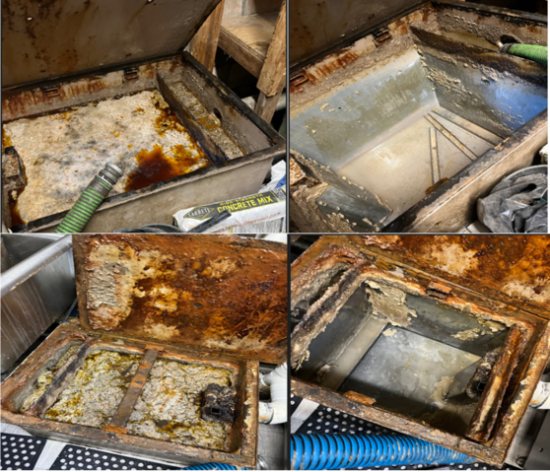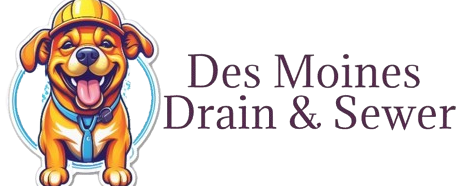Operating a restaurant or commercial kitchen in Des Moines requires properly functioning grease traps to prevent costly plumbing emergencies and maintain compliance with local health regulations. Des Moines Drain and Sewer provides specialized grease trap cleaning services designed to keep your kitchen operating smoothly while protecting your plumbing system from damaging fat, oil, and grease (FOG) buildup.
Our experienced technicians understand the unique challenges faced by Des Moines food service establishments and deliver thorough, professional grease trap maintenance with minimal disruption to your business operations. From small under-sink units to large external interceptors, we have the equipment and expertise to service all types of grease management systems efficiently and effectively.

Our Grease Trap Cleaning Services in Des Moines, IA
At Des Moines Drain and Sewer, we offer comprehensive grease trap solutions to address the needs of restaurants, cafeterias, schools, hospitals, hotels, and other commercial kitchens throughout the Des Moines metro area.
Standard Grease Trap Cleaning
Our thorough grease trap cleaning process includes:
- Complete pumping and removal of trap contents
- Scraping and cleaning of trap walls and baffles
- Proper disposal of all extracted waste
- Inspection of trap components
- Flow testing to ensure proper operation
- Detailed service documentation
- Compliance verification
We remove all accumulated fats, oils, grease, and food particles from your trap, ensuring it functions at peak efficiency to protect your plumbing system and keep you compliant with local regulations.
Grease Interceptor Maintenance
Our grease interceptor maintenance services cover:
- Large-capacity interceptor pumping
- High-pressure cleaning of interceptor chambers
- Baffle inspection and cleaning
- Inlet and outlet clearing
- Structural assessment
- Component testing
- Waste removal and proper disposal
For larger establishments with external grease interceptors, our specialized equipment can handle even the largest systems efficiently and thoroughly.
Emergency Grease Trap Services
Count on our emergency grease trap services for:
- Overflow response
- Clogged grease trap clearing
- Backup prevention
- Failed trap repair
- System malfunction diagnostics
- After-hours emergency service
- Weekend and holiday response
When grease trap problems threaten to shut down your kitchen, our team responds quickly to resolve the issue and get your operation back up and running.
Preventative Maintenance Programs
Our customized maintenance programs include:
- Scheduled regular cleaning based on your usage
- Detailed record-keeping for compliance
- System performance monitoring
- Early problem detection
- Consistent service scheduling
- Automatic appointment scheduling
- Compliance documentation management
Regular maintenance prevents unexpected failures and helps you maintain compliance with health department requirements. Our preventative programs are tailored to your specific operation’s needs.
How Our Grease Trap Cleaning Process Works
- Initial Assessment: We evaluate your grease trap system type, size, and condition
- Service Preparation: We prepare the area to prevent mess or contamination
- Lid Removal: We carefully access the trap with proper tools
- Content Measurement: We document the levels before pumping for compliance records
- Complete Pumping: We remove all contents using specialized equipment
- Manual Cleaning: We scrape walls, baffles, and components to remove residual buildup
- Trap Inspection: We check for damage, wear, or potential issues
- Reassembly: We properly reseal and secure all components
- Flow Testing: We verify proper operation of the restored system
- Documentation: We provide detailed service records for regulatory compliance
Why Choose Des Moines Drain and Sewer for Grease Trap Cleaning
When you choose Des Moines Drain and Sewer for your grease trap cleaning needs, you’re selecting a company committed to excellence:
- Specialized expertise – Our technicians are specifically trained in commercial grease trap maintenance
- Health code knowledge – We understand Des Moines and Iowa restaurant regulations
- Compliance documentation – We provide detailed records for health inspections
- Flexible scheduling – Service available during off-hours to minimize business disruption
- Comprehensive service – We don’t just pump; we fully clean and inspect your system
- Professional equipment – We use commercial-grade pumps and cleaning tools
- Proper disposal practices – All waste is handled according to environmental regulations
Our goal is to provide hassle-free service that keeps your kitchen running smoothly while maintaining regulatory compliance.
Our Commercial Grease Trap Services In Des Moines, IA
Restaurant Grease Trap Cleaning
We understand the unique needs of restaurants. Our specialized services include:
- Full-service restaurant grease trap maintenance
- Fast food establishment trap cleaning
- Buffet and high-volume kitchen service
- Fine dining restaurant grease management
- Cafe and small kitchen trap maintenance
- Food truck grease trap service
- Chain restaurant compliance programs
Our team works with your schedule to provide service with minimal disruption to your business operations.
Institutional Kitchen Service
Our institutional clients benefit from our specialized services for:
- School cafeteria grease trap maintenance
- Hospital kitchen grease management
- Nursing home facility service
- Correctional facility kitchen maintenance
- University dining hall trap cleaning
- Government facility service
- Corporate cafeteria maintenance
We understand the specific requirements and constraints of institutional kitchens and provide appropriate service solutions.
Grease Trap Regulations We Follow in Des Moines, IA
Des Moines food service establishments must comply with several important regulations regarding grease traps:
- Des Moines Municipal Code Section 118 – Requires proper grease management systems for all food service establishments
- Des Moines Metropolitan Wastewater Reclamation Authority (WRA) Regulations – Sets standards for fats, oils, and grease discharge
- Iowa Department of Inspections and Appeals – Includes grease trap maintenance in health inspection criteria
- Iowa DNR Requirements – Governs proper disposal of trap waste
- Local Plumbing Codes – Dictate installation and maintenance standards
How Often Should Grease Traps Be Cleaned?
The required frequency for grease trap cleaning depends on several factors:
| Type of Establishment | Average Cleaning Frequency |
| Fast Food Restaurant | Every 1-2 weeks |
| Full-Service Restaurant | Every 2-4 weeks |
| Cafeteria | Every 2-4 weeks |
| Coffee Shop/Cafe | Every 1-2 months |
| Hotel Kitchen | Every 1-2 months |
| Institutional Kitchen | Every 1-3 months |
| Smaller Under-Sink Traps | Every 1-2 weeks |
| Large External Interceptors | Every 1-3 months |
The “25% Rule” is a common industry standard: grease traps should be cleaned when FOG and food solids reach 25% of the trap’s capacity.
Factors affecting frequency include:
- Kitchen size and volume
- Types of food prepared
- Hours of operation
- Trap size and capacity
- Local regulatory requirements
Our team can help determine the optimal cleaning schedule for your specific operation.
How Much Do Grease Trap Cleaning Services Cost in Des Moines, IA?
We believe in fair, transparent pricing for our Des Moines customers. Here’s what you can generally expect:
| Trap Size | Standard Service | Emergency Service |
| Small (under 25 gallons) | $175–$275 | $275–$375 |
| Medium (25-100 gallons) | $275–$375 | $375–$475 |
| Large (100-500 gallons) | $375–$575 | $475–$675 |
| Commercial Interceptor (500+ gallons) | $575–$1,200+ | $675–$1,400+ |
| Maintenance Program | 10-15% discount | Priority emergency service |
Factors that affect grease trap cleaning costs include:
- Size and type of trap
- Accessibility of the unit
- Level of buildup and difficulty of cleaning
- Disposal fees
- Emergency vs. scheduled service
- Frequency of service
- Additional services needed
We always provide a clear, upfront quote before beginning work. Many customers find that regular scheduled maintenance is more cost-effective than emergency service.
Signs Your Grease Trap Needs Cleaning
Watch for these warning signs that indicate your grease trap requires immediate service:
- Slow drainage in sinks near the trap
- Foul odors coming from drains or the trap area
- Backup or overflow from floor drains
- Gurgling sounds from plumbing fixtures
- Grease buildup visible in sinks or drains
- Multiple clogged drains throughout the kitchen
- Time-based threshold – If it’s been longer than your regular cleaning interval
- 25% capacity reached – When FOG levels reach 25% of trap capacity
If you notice any of these symptoms, prompt professional cleaning is necessary to prevent more serious issues.
Benefits of Regular Grease Trap Maintenance
Investing in routine grease trap cleaning provides numerous advantages:
- Prevents costly backups and emergencies – Avoiding business interruption
- Ensures regulatory compliance – Passing health inspections
- Extends plumbing system lifespan – Reducing capital expenses
- Eliminates foul odors – Improving kitchen environment
- Reduces risk of pest infestation – Enhancing food safety
- Prevents environmental contamination – Supporting sustainability goals
- Maintains kitchen efficiency – Improving operational flow
- Documents due diligence – Protection from liability
Our preventative maintenance programs help you realize these benefits while simplifying your compliance efforts.
Areas We Serve for Grease Trap Cleaning
Des Moines Drain and Sewer proudly serves commercial kitchens throughout:
- Des Moines – 50309, 50310, 50311, 50312, 50313, 50314, 50315, 50316, 50317, 50320, 50321
- West Des Moines – 50265, 50266, 50325
- Ankeny – 50021, 50023
- Urbandale – 50322, 50323
- Johnston – 50131
- Clive – 50325
- Waukee – 50263
- Altoona – 50009
- Norwalk – 50211
- Indianola – 50125
- Grimes – 50111
- Pleasant Hill – 50327
- Bondurant – 50035
- Adel – 50003
Keep Your Kitchen Running Smoothly!
Contact Des Moines Drain and Sewer today for professional, reliable grease trap cleaning service from the area’s most trusted plumbing team.
Call now (515) 349-0902 or schedule your free estimate online.
- Flexible scheduling to minimize business disruption
- Complete compliance documentation provided
- Professional, uniformed technicians
- Fully insured service
